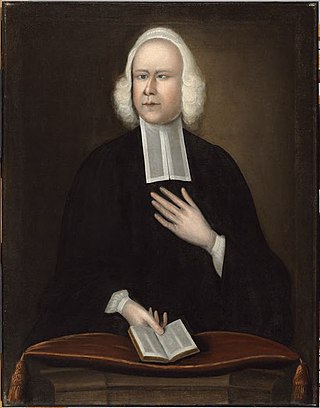
George Whitefield, also known as George Whitfield, was an English Anglican minister and preacher who was one of the founders of Methodism and the evangelical movement. Born in Gloucester, he matriculated at Pembroke College, Oxford in 1732. There, he joined the "Holy Club" and was introduced to John and Charles Wesley, with whom he would work closely in his later ministry. Unlike the Wesleys, he embraced Calvinism.
The Great Awakening was a series of religious revivals in American Christian history. Historians and theologians identify three, or sometimes four, waves of increased religious enthusiasm between the early 18th century and the late 20th century. Each of these "Great Awakenings" were characterized by widespread revivals led by evangelical Protestant ministers, a sharp increase of interest in religion, a profound sense of conviction and redemption on the part of those affected, an increase in evangelical church membership, and the formation of new religious movements and denominations.

Hazlehurst is a city in and the county seat of Copiah County, Mississippi, United States, located about 30 miles (48 km) south of the state capital Jackson along Interstate 55. The population was 4,009 at the 2010 census. It is part of the Jackson Metropolitan Statistical Area. Its economy is based on agriculture, particularly tomatoes and cabbage.
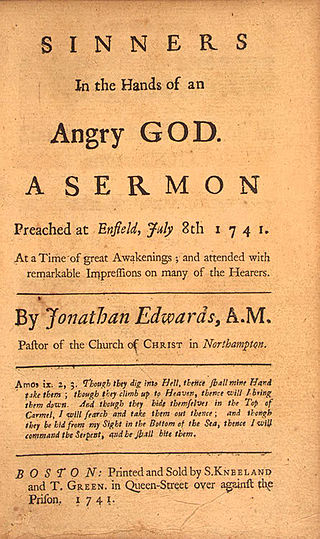
The First Great Awakening or the Evangelical Revival was a series of Christian revivals that swept Britain and its thirteen North American colonies in the 1730s and 1740s. The revival movement permanently affected Protestantism as adherents strove to renew individual piety and religious devotion. The Great Awakening marked the emergence of Anglo-American evangelicalism as a trans-denominational movement within the Protestant churches. In the United States, the term Great Awakening is most often used, while in the United Kingdom, the movement is referred to as the Evangelical Revival.

Neomodern or neomodernist architecture is a reaction to the complexity of postmodern architecture and eclecticism in architecture, seeking greater simplicity. The architectural style, which is also referred to as New Modernism, is said to have legitimized an outlook of comprehensive individualism and relativism.
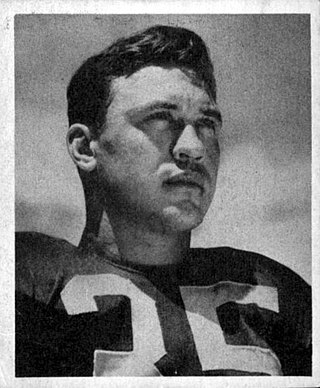
William McGarvey Dudley, nicknamed "Bullet Bill", was an American football halfback, safety and return specialist who played in the National Football League (NFL) for the Pittsburgh Steelers, the Detroit Lions, and the Washington Redskins. He was inducted into the Pro Football Hall of Fame in 1966 and the Virginia Sports Hall of Fame in 1972.

A series of bombings were carried out or attempted by Galleanists from April through June 1919. The targets included anti-immigration politicians, anti-anarchist officials, and prominent businessmen, as well as a journalist and a church. Almost all of the bombs were sent by mail. The bombings were one of the major factors contributing to the First Red Scare. Two people were killed, including one of the bombers, and two injured.

Bobby Ray Franklin is a former American football player and coach. He played college football as a quarterback at the University of Mississippi and professionally as a safety in the National Football League (NFL) with the Cleveland Browns. Franklin served as the head football coach at Northwest Mississippi Community College from 1981 to 2004, leading his teams to NJCAA National Football Championships in 1982 and 1992. He has been named to seven Halls of Fame for his athletic and coaching accomplishments.
Frank Lambert may refer to:
The 1963 NCAA University Division football season was played by American football teams representing 120 colleges and universities recognized the National Collegiate Athletic Association (NCAA) as major programs. The remaining 299 colleges and universities that were NCAA members and fielded football teams competed in the 1963 NCAA College Division football season.
The 1931 college football season saw the USC Trojans win the Knute Rockne Memorial Trophy as national champion under the Dickinson System, as well as the No. 1 position from each of the other three contemporary major selectors. Rockne, who had coached Notre Dame to a championship in 1930, had been killed in a plane crash on March 31, 1931. For the first time, the champion under the Dickinson System also played in a postseason game. The 1932 Rose Bowl, promoted as a national championship game between the best teams of East and West, matched USC and Tulane, No. 1 and No. 2 in the Dickinson ratings. USC won, 21–12, and was awarded the Albert Russel Erskine Trophy.

The 1932 college football season saw the Michigan Wolverines win the Knute Rockne Memorial Trophy as national champion under the math-based Dickinson System. Because the "Big Nine" conference didn't permit its teams to play in the postseason, however, the Wolverines were not able to accept a bid to the Rose Bowl. As such, the Pasadena game matched the No. 2 and No. 3 teams, USC and Pittsburgh, with the USC Trojans winning the east–west matchup 35–0. The other four contemporary math system selectors all selected USC as national champion. This was also the last season NFL would use college football rules.
The 1935 college football season was the last one before the Associated Press (AP) writers' poll was used in selecting the national champion. There were seven contemporary math system selectors that year who are informally recognized by the NCAA as "nationwide in scope". The Dickinson System, run by University of Illinois Professor Frank Dickinson, selected Southern Methodist University (SMU) as best in the nation. The Houlgate System, created by Carroll Everard "Deke" Houlgate Sr., also selected SMU. The contemporary Boand, Litkenhous and Poling math rating systems all selected Minnesota as the No. 1 team in the nation. The Dunkel System selected Princeton as its top team. The Williamson System, by Paul O. Williamson of New Orleans, ranked Texas Christian University first.
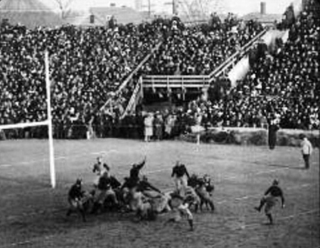
The 1912 college football season was the first season of the modern era of college football, as the NCAA implemented changes to increase scoring:
The 1937 college football season ended with the Panthers of the University of Pittsburgh being named the nation's No. 1 team by 30 of the 33 voters in the Associated Press writers' poll. The AP poll was in its second year, and seven votes were taken during the final weeks of the 1937 season, starting with October 18. Each writer listed his choice for the top ten teams, and points were tallied based on 10 for first place, 9 for second, etc., and the AP then ranked the twenty teams with the highest number of points. With 33 writers polled, Pitt received 30 first place votes and 3 second-place, for a total of 327 points.
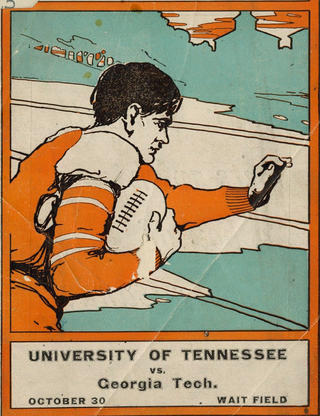
The 1909 college football season was the first for the 3-point field goal, which had previously been worth 4 points. The season ran from Saturday, September 25, until Thanksgiving Day, November 25, although a few games were played on the week before.
One human poll comprised the 1939 National Collegiate Athletic Association (NCAA) football rankings. Unlike most sports, college football's governing body, the NCAA, does not bestow a national championship, instead that title is bestowed by one or more different polling agencies. There are two main weekly polls that begin in the preseason—the AP Poll and the Coaches' Poll. The Coaches' Poll began operation in 1950; in addition, the AP Poll did not begin conducting preseason polls until that same year.
Frank Atlee Mason was an American college football coach and an attorney. He was the first full-time football coach at Harvard University.
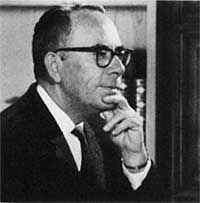
Joseph Louis Franklin was a Robert A. Welch Professor of Chemistry at Rice University known for his research in mass spectrometry and ion molecule chemistry. The Frank H. Field and Joe L. Franklin Award for Outstanding Achievement in Mass Spectrometry is named after him and Frank H. Field.
Joseph Crespino is a political historian of the 20th-century United States, specializing in the history of the American South and of modern conservatism. He is the author of two books and an edited collection and has been named a Top Young Historian by the History News Network at George Mason University.










